AURORA, Colo. – At least three Colorado police officers are under investigation after inappropriate photos surfaced of them near a memorial rally held Saturday for Elijah McClain, an unarmed Black man who was killed during an encounter with Aurora police officers last summer.
CBS 4 in Denver reported Monday that multiple law enforcement sources said the photos showed the unnamed officers reenacting the carotid chokehold used on McClain, 23, the night of Aug. 24, 2019, as he walked home from a convenience store. McClain, who was also injected with the tranquilizer ketamine by paramedics, went into cardiac arrest at the scene.
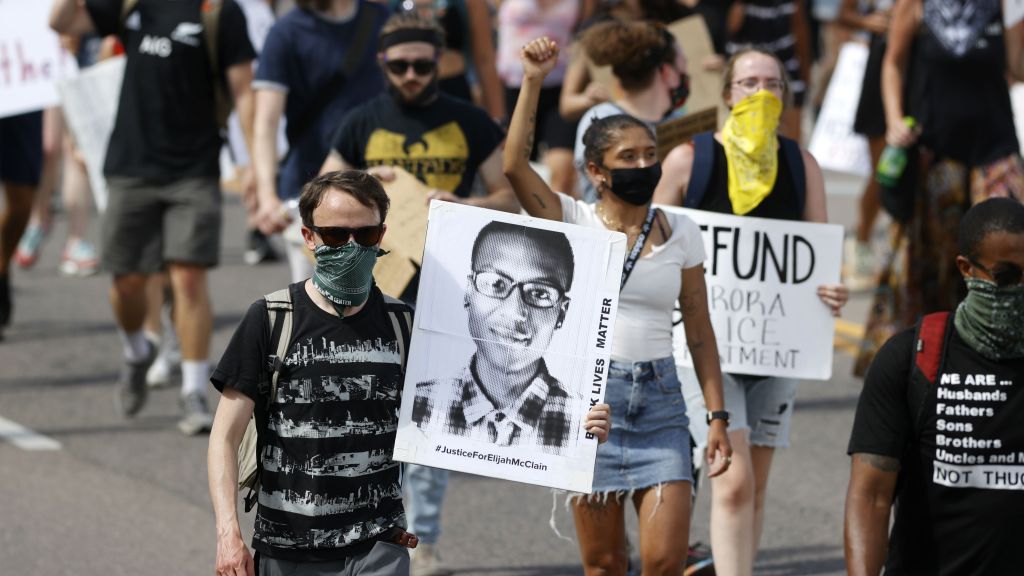
Demonstrators walk down Sable Boulevard in Aurora, Colo., during a Saturday, June 27, 2020, rally and march over the death of 23-year-old Elijah McClain. McClain, 23, died following an Aug. 24, 2019, encounter with Aurora police in which the unarmed Black man was put in a carotid chokehold and injected with ketamine.
He died six days later after being declared brain dead.
Vanessa Wilson, interim chief of the Aurora Police Department, confirmed Monday that multiple officers are under investigation. Wilson said the probe began Thursday when an Aurora police officer reported the existence of the photos to Internal Affairs investigators.
“All involved officers were immediately placed on administrative leave with pay in non-enforcement capacities,” Wilson said in a statement. “I immediately ordered Internal Affairs to make this investigation their top priority.”
The investigation was completed Monday evening, the interim chief said.
“This investigation will be publicly released in its entirety promptly upon its conclusion,” Wilson said. “This will include reports, photographic evidence obtained, officers’ names and my final determination, which can rise to the level of termination.”
Anger over McClain’s death, which was caught on body camera footage, has boiled over in recent weeks as protests against police brutality broke out across the U.S. The protests began following the May 25 death of George Floyd, who was killed in Minneapolis police custody.
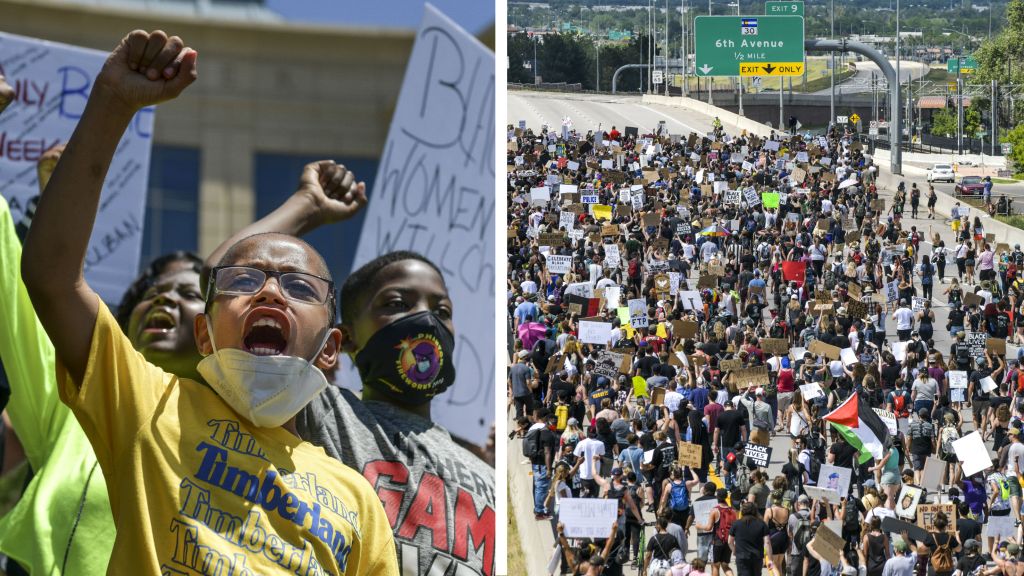
At left, a young boy chants at a rally outside the Aurora Police Department Saturday, June 27, 2020, while, at right, protesters shut down I-225 in both directions as they demand justice for Elijah McClain. McClain, 23, died following an Aug. 24, 2019, encounter with Aurora police in which the unarmed Black man was put in a carotid chokehold and injected with ketamine.
Colorado Gov. Jared Polis announced Thursday, the same day the internal investigation of the photos began, that he had appointed state Attorney General Phil Weiser to open an independent investigation of McClain’s death.
The three officers involved in McClain’s death, Nathan Woodyard, Jason Rosenblatt and Randy Roedema, have been taken off the streets
McClain’s family issued a statement to CBS 4 about the alleged photos in which they said the Aurora Police Department has found “a new low.”
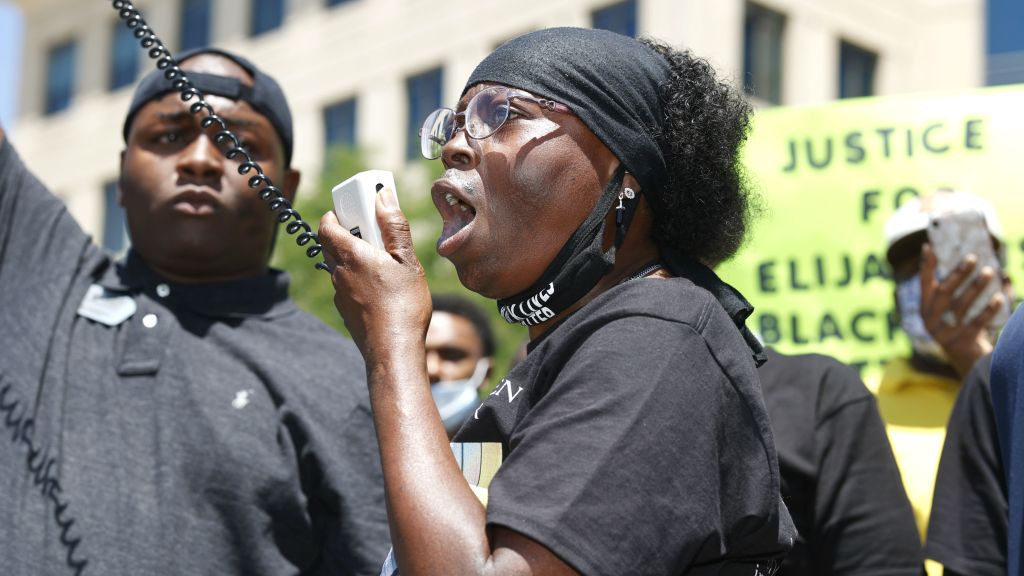
Sheneen McClain speaks during a rally and march over the death of her son, Elijah McClain, Saturday, June 27, 2020, outside the police department in Aurora, Colo. Elijah McClain, 23, died following an Aug. 24, 2019, encounter with Aurora police in which the unarmed Black man was put in a carotid chokehold and injected with ketamine.
“This is a department where officers tackled an innocent young Black man for no reason, inflicted outrageous force – including two carotid chokeholds – for 15 minutes as he pled for his life, joked when he vomited, and threatened to sic a dog on him for not lying still enough as he was dying,” the statement read. “They tampered with their body cameras to hide the evidence. They exonerated the killers.
“They deployed riot police and spewed pepper gas on peaceful protestors at a vigil of mourners playing the violin. And now this.”
Cellphone footage from the scene of the weekend violin vigil shows officers in riot gear using pepper spray to disperse the apparently peaceful crowd. In some of the footage, a participant can be heard screaming, “No! No! No!” in despair as officers marched single file into the area of the vigil before moving in on the demonstrators.
In other cellphone footage, demonstrators stand with their hands in the air as baton-wielding officers advance toward them.
A violinist who was participating in the vigil began playing alone, stopping the police from pushing any further, reporter Marc Sallinger tweeted.
Police officials tweeted that night that a “small contingent” of the protesters armed themselves with rocks and sticks and ignored police orders to move back.
“This is now an unlawful assembly. Disperse,” the tweet read. “Peaceful protesters and community members should move to the (southwest) parking lot by the library.”
Once tensions calmed, the vigil was allowed to continue. Three people were taken into custody by police.
Aurora Mayor Mike Coffman has since called a special meeting for Tuesday evening to demand answers from police officials over the means used to disperse the crowd.
“We are hearing many questions and concerns from the community about the tactics used by the Aurora Police Department during Saturday’s protests, and council needs to hear first-hand specifically what happened,” Coffman said in a statement. “The tragic death of Elijah McClain brought out many peaceful people over the weekend who want their voices heard, and unfortunately there were disruptions that overshadowed the broader message.”
McClain, who is described by loved ones as a gentle soul who played the violin for shelter animals to soothe their anxiety, was walking home Aug. 24 after buying his cousin some iced tea at a nearby store. A man driving by spotted him wearing a ski mask, which family members said he often wore to ward off a chill caused by anemia.
McClain was listening to music and dancing, his movements catching the attention of the passerby, who told a 911 dispatcher a “sketchy” man was walking around in a mask and waving his arms.
The caller said he did not see a weapon and told the dispatcher, “He might be a good person or a bad person.”
Listen to the 911 call below.
Woodyard was the first to respond, followed by Rosenblatt and Roedema. McClain, who told Woodyard he had a right to be walking where he was, asked the officers to leave him alone.
“I am an introvert. Please respect the boundaries that I am speaking,” he told the officers.
When McClain refused to stay still, the officers tackled him to the ground and tried twice to put him in a carotid hold, designed to cut off blood flow to the brain and make a person pass out. One of the officers claimed in the video footage that McClain had tried to grab another officer’s weapon.
Watch all of the body camera footage from multiple Aurora police officers below. Warning: The images may be disturbing to some viewers.
After McClain awoke from a brief loss of consciousness, he began crying and begging the officers to let him up. Over the next 15 minutes or so, the officers pinned McClain to the ground as he wept, vomited and told the officers he could not breathe.
He also delivered a heartbreaking monologue aimed at the officers, who appeared to ignore his words.
“I have my ID right here. My name is Elijah McClain. That’s my house. I was just going home,” McClain sobbed. “I’m an introvert. I’m different. I’m just different, that’s all. That’s all I was doing. I’m so sorry.”
He continued to plead with the officers.
“I have no gun. I don’t do that stuff. I don’t do any fighting. Why are you attacking me? I don’t even kill flies! I don’t eat meat!”
He said he didn’t judge people who do eat meat. “Forgive me,” he said.
As the officers continued to talk amongst themselves, McClain appeared to be pleading for his life.
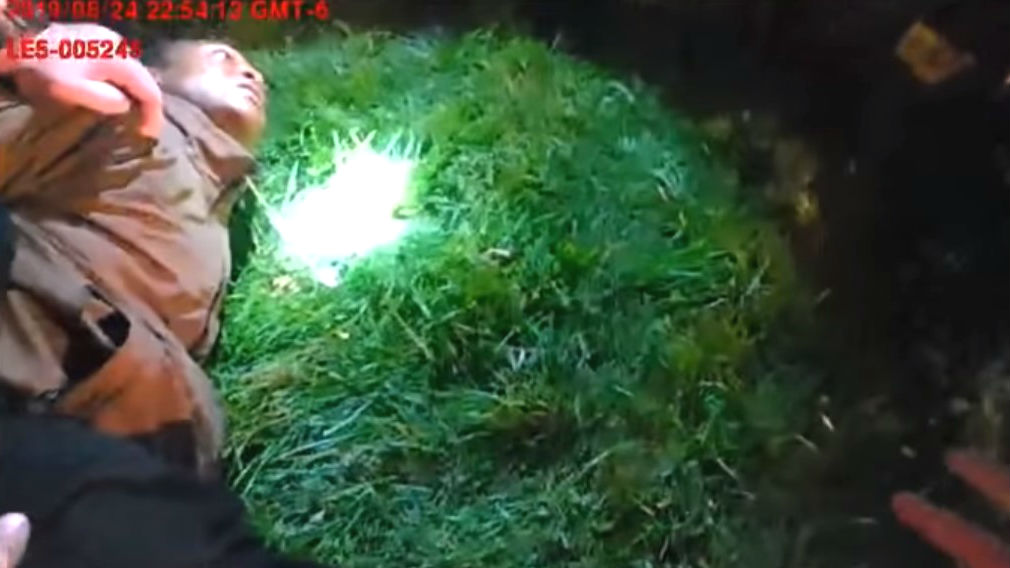
Body camera footage from Aug. 24, 2019, shows Aurora, Colo., police officers pinning down Elijah McClain, 23, who was stopped as he walked home from a convenience store. Gov. Jared Polis announced Thursday, June 25, 2020, that he had ordered a new probe into McClain’s death, which stemmed from his encounter with police that night.
“Forgive me. All I was trying to do was become better,” he pleaded breathlessly. “I’ll do it. I’ll do it. I’ll do anything. Sacrifice my identity. I’ll do it.”
McClain vomited multiple times from the pressure applied to his chest and neck. He repeatedly apologized as he struggled to breathe.
“You all are phenomenal. You are beautiful,” he said. “And I love you. Try to forgive me.”
Aurora firefighter paramedics eventually arrived at the scene, prompted by the officers’ use of a chokehold. A medic injected McClain with 500 milligrams of ketamine.
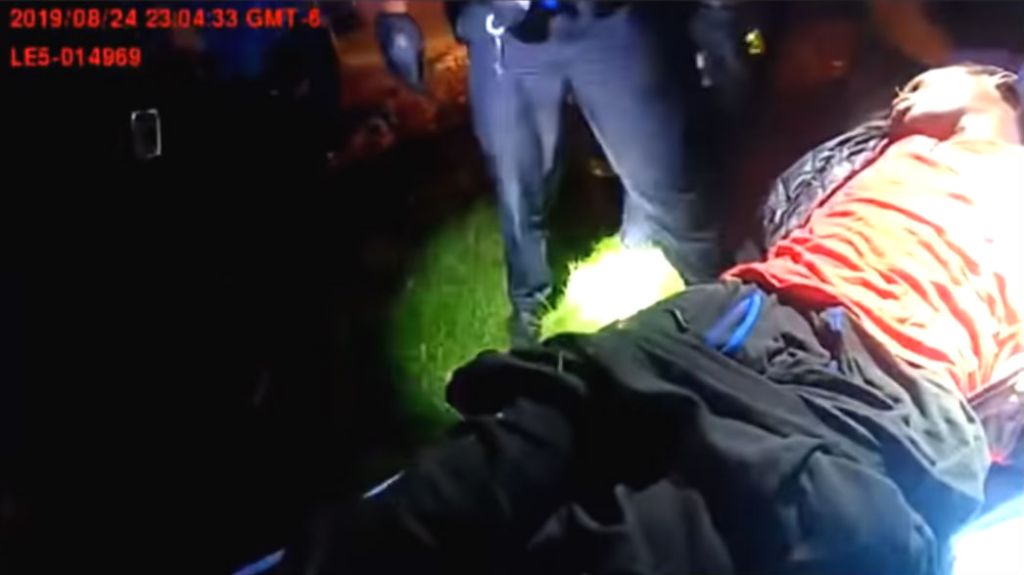
Body camera footage from Aug. 24, 2019, shows an unconscious Elijah McClain, who was stopped as he walked home from a convenience store, lying on a paramedics’ gurney after being injected with ketamine. Gov. Jared Polis announced Thursday, June 25, 2020, that he had ordered a new probe into McClain’s death, which stemmed from his encounter with police that night.
Eight minutes after the injection, McClain’s heart stopped beating. He was revived but had a second cardiac arrest early the next morning.
His brain having been irreversibly deprived of oxygen, McClain was taken off life support six days after his arrest. His family opted to donate several of his organs to save others’ lives.
The pathologist who conducted McClain’s autopsy wrote in his report that he could not determine the cause of his death. Dave Young, district attorney for Colorado’s 17th Judicial District, subsequently declined to press charges against the officers or medics involved.
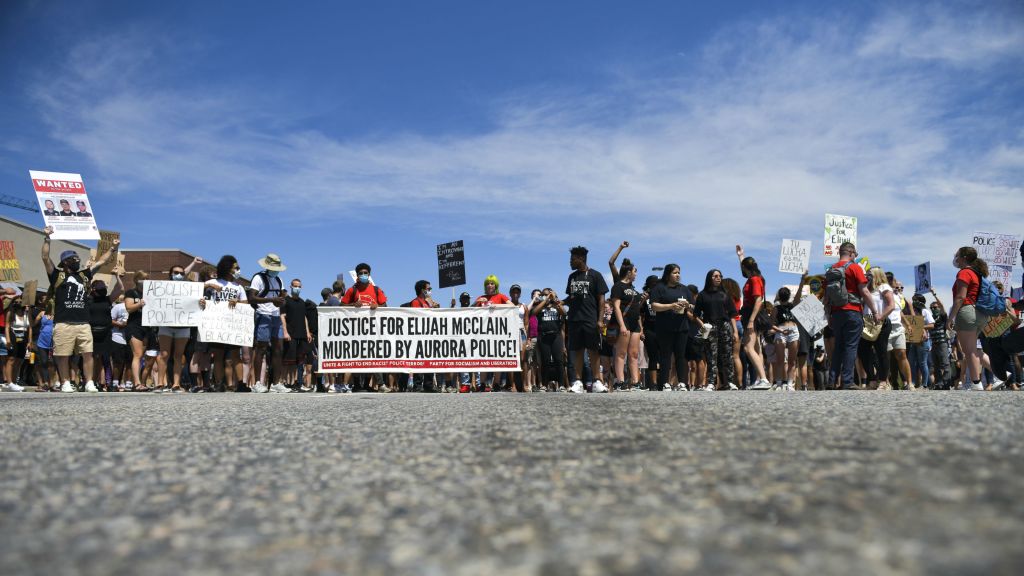
Protesters march toward the highway Saturday, June 27, 2020, in Aurora, Colo., as they demand justice for Elijah McClain. McClain, 23, died following an Aug. 24, 2019, encounter with Aurora police in which the unarmed Black man was put in a carotid chokehold and injected with ketamine.
Young reiterated his position in a statement last week, saying that the evidence does not support a homicide filing against anyone involved.
“Although I may not agree with the officers’ actions in this incident, in order to prove a crime, the evidence must demonstrate beyond a reasonable doubt that the force used was not justified,” the statement read, according to CBS 4. “In this context, the legal question of ‘justification’ is based on whether the involved officers held a reasonable belief that the use of force was necessary.”
Young said he could not disprove, based on the evidence and Colorado law, that the officers reasonably believed they needed to use the level of force McClain was subjected to. Therefore, he said, he could not prove the use of force was not justified.
“Ultimately, while I may share the vast public opinion that Elijah McClain’s death could have been avoided, it is not my role to file criminal charges based on opinion, but rather, on the evidence revealed from the investigation and applicable Colorado law,” Young said.







